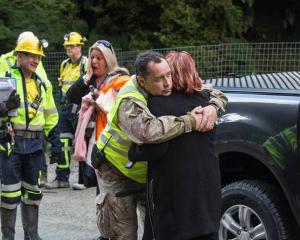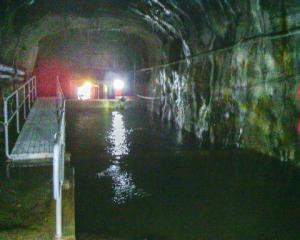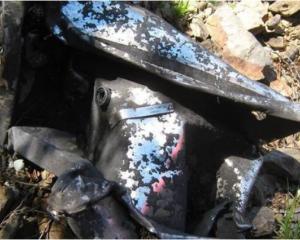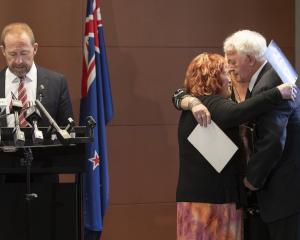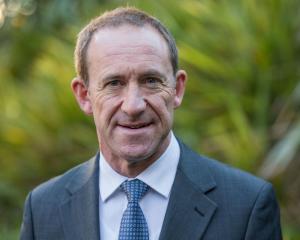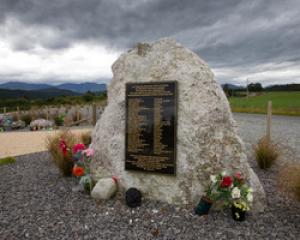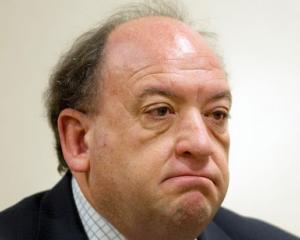Hundreds took part in a candlelight vigil at Holy Trinity Anglican Church and others gathered at homes or pubs as the town mourned the loss of 29 men in the Pike River Coal mine disaster.
Messages were scrawled on paper covering a large trestle table in the church foyer.
"Just crying," reads one.
A yellow Victim Support ribbon fluttered in the cold wind outside Revington's Hotel. The air was heavy inside; sometimes the tension was broken by a gruff joke or a strained laugh. The publican cried openly as she served beer.
Locals greeted each other with sombre handshakes and hugs, most wearing sunglasses inside.
Prime Minister John Key said last night New Zealand was a nation in mourning and the disaster was a national tragedy.
"There are 29 men whose faces and names we have come to know who will never walk among us again," he said in an emotional speech at a press conference following the news a second explosion at the West Coast mine yesterday afternoon meant there could be no survivors.
The miners and contractors had not been heard from since the first explosion on Friday afternoon.
"This has been the news that all of New Zealand has been dreading," Mr Key said.
Pike River Coal chief executive Peter Whittall broke the heart-breaking news to the miners' families about 4pm, after he saw footage of the second explosion, which happened at 2.37pm.
It was much bigger than last Friday's blast.
"This probably takes it up to a point where I'm unlikely to see workmates again - I'm unlikely to see them walk out of that mine," an emotional Mr Whittall told a press conference.
Holding his wife's hand and with two of his children at his side, he added: "This is still an ongoing operation ... we've still got 29 men in there and we need to get them out".
Gas levels in the mine would continue to be monitored but Mr Whittall said crews would still not be sent in until it was certain their safety was assured.
"We still can't go into an unsafe mine. It's just as unsafe now as it was two hours ago. Gas will still be coming out of the coal. There's still an ignition source. There's no doubt there's still burning methane from that explosion."
Minutes before talking to the media, Mr Whittall broke the news of the second explosion to the miners' families.
That meeting had begun with some optimism crews would soon be entering the mine. The first robot in the mine had been reactivated, a second was on its way in and a specialist mining robot was due from the United States.
A hole being drilled into the mine had broken through and samples were already being tested.
Grey District Mayor Tony Kokshoorn said the meeting was then told about the enormous explosion and that there was no way anyone could have survived the blast.
After being told the news, everyone in the meeting just "cracked up".
"They just sobbed openly and just fell to the floor and many people were just shouting out anger, simple as that. They were just sickened by the whole thing and a lot of them felt sort of misled.
"There was some anger directed at the police, certainly not at Mr Whittall ... at that point we just started consoling each other, simple as that.
"I tell you it was unbelievable. This was the West Coast's darkest hour. I'm telling you, it doesn't get worse than this."
Yesterday's explosion lasted about 30 seconds, and Mr Whittall did not consider it was sparked by any of the rescue crew's measures.
Mr Key will travel back to Greymouth today to express condolences to the families and thank all those involved in the planned rescue efforts.
Flags on all government buildings will fly at half-mast today.
Police Superintendent Gary Knowles, who headed the rescue operation, said yesterday's event was his most tragic as a policeman.
He came in for fierce criticism from those who believed rescuers should have been allowed to enter the mine, including some of the miners' families.
But Police Commissioner Howard Broad said Supt Knowles had led "an extremely professional and thoroughly detailed operation".
Mining safety expert David Feickert said the chances were the miners had not suffered. They probably would have been overcome by carbon monoxide earlier and would not have have been affected by yesterday's explosion.
At least three inquiries are being mounted, including a commission of inquiry promised by Mr Key and Labour Minister Kate Wilkinson. She declined to speculate whether the mine would ever reopen.
The Chief Coroner, Judge Neil MacLean, will hold his own special inquiry, starting today. It was too soon to say whether there would be an inquest.
The inquiry would help families of the dead by drawing together enough evidence to issue interim death certificates on which insurance companies might be prepared to pay out.
Police Minister Judith Collins said she expected police to hold their own inquiry.
The loss of life at Pike River was the largest in a New Zealand disaster since the Air New Zealand Mt Erebus crash on November 28, 1979.
Fourteen were killed in the collapse of the viewing platform at Cave Creek - like Pike River, also in the Paparoa National Park - on April 28, 1995.
When the Kaitawa was wrecked near Cape Reinga on May 23, 1966, 29 people died.



